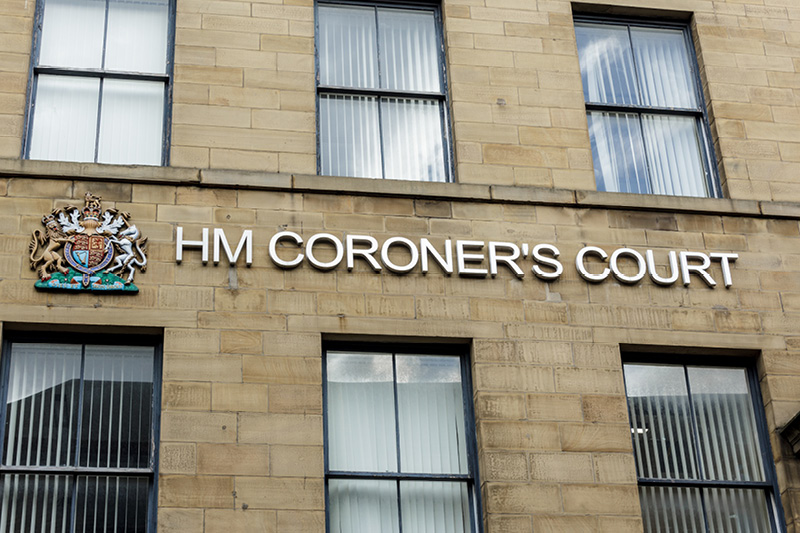Mesothelioma: the coroner, post-mortem examinations and inquests

At the end of a person’s life, at an already difficult time, the families of those with mesothelioma have to face the difficult prospect of their loved one’s death being referred to the coroner and funeral plans being held up if a post-mortem examination is needed. There will then have to be an inquest. Whilst this is undoubtedly a challenging time for all, unfortunately it is a process that needs to occur legally, and can be important if a compensation claim is ongoing.
What happens when a person with mesothelioma dies?
When someone dies with known or suspected mesothelioma the death must be referred to the coroner. This is the case regardless of whether the person dies at home, in hospital or in a hospice.
The GP or out-of-hours doctor should be called to confirm that the person with mesothelioma has died. This doctor is required by law to inform the Coroner about a death from mesothelioma without delay. It is recommended that the family highlights to the certifying doctor that their loved one had mesothelioma – a cancer caused by asbestos – so it is not missed and the coroner is informed. A coroner’s officer will then contact the family
Will a post-mortem examination/autopsy be needed?
A post-mortem examination, also known as an autopsy, is a physical examination that takes place following death to establish or confirm the cause of death. More often than not the person with mesothelioma will have had a tissue biopsy during their lifetime to confirm the diagnosis and therefore the coroner may not require a post-mortem examination to take place.
However, if the person was perhaps too unwell to have a biopsy, or the biopsy results were inconclusive, then the coroner may decide that the person with mesothelioma must have a post-mortem examination to confirm the cause of death.
It is the coroner’s decision whether or not to order a post-mortem examination. However, sometimes the family of the deceased may be asked how they feel about it. If the person with mesothelioma has a compensation claim ongoing, it is advisable to contact the solicitor acting for advice about whether a post-mortem examination may be needed for the legal claim. It can be crucial if there was no in-life biopsy confirming the diagnosis or if the biopsy was inconclusive. There could be other reasons why a biopsy may be needed, for example to consider the impact of other illnesses on the person’s life expectancy had they not developed mesothelioma.
On occasion, the coroner may not order a post-mortem examination when actually it may be needed for the claim. It is useful to keep an open dialogue with your solicitor around this time. Whilst it is rarely needed, a post-mortem examination can be arranged privately if required.
Why are tissue samples taken?
Following the post-mortem examination, the pathologist may need to retain tissue samples for tests to be undertaken to provide a definitive diagnosis and cause of death. It may take several weeks or even months for the test results to become available. Once this process is completed, the family may be asked what they would like to be done with the samples and the options usually include disposal or donating them to medical research. Again, if the deceased was in the process of making a claim or the family are anticipating commencing a claim, advice should be sought from the solicitor acting as to whether the tissue samples should be retained. Whilst unusual, if there is any dispute about the diagnosis, the tissue samples may need to be tested again so it is vital that they are retained until the claim is concluded. Indeed if the tissue samples are destroyed it is sometimes possible for the defendants to argue that they have been deprived of the opportunity to investigate, sometimes successfully striking out the claim as a result.
Inquest procedure
An inquest is a legal hearing where the coroner will review evidence and determine the cause of someone’s death. The coroner will then give a verdict now known as a ‘conclusion’ from a set list. Usually, where the death is from mesothelioma, the conclusion is ‘industrial disease’. However, on occasion, the conclusion given may be ‘narrative’ where the coroner will set out reasons why they were unable to give one of the standard conclusions. This can happen if the coroner considers there is not enough evidence to link the mesothelioma to asbestos exposure or industrial causes.
Impact of coroner’s finding on the legal claim
If there is a compensation claim ongoing and the post-mortem examination is not conclusive of mesothelioma then it is possible for tissue samples to be tested further or an opinion(s) obtained from medical experts as to whether the cancer is a mesothelioma on the balance of probabilities. This evidence can then be used to progress the claim.
If the cause of death is confirmed as mesothelioma at post-mortem but the coroner’s conclusion is not ‘industrial disease’, then that does not mean the claim cannot continue. It may be that, at the time of the inquest, there was not enough information or evidence available for the coroner to conclude that the mesothelioma and death was due to asbestos and therefore industrial disease. However, evidence may be obtained subsequently. The conclusion of the coroner will not determine the outcome of the legal compensation claim but, if the finding is industrial disease, that is helpful.
Conclusion
Involvement of the coroner following a loved one’s death from mesothelioma can make an already difficult time harder. Understandably it can be upsetting, worrying and daunting for the family of a person with mesothelioma to have to be involved in the coronial process. However, it cannot be avoided and it is hoped that good communication with the coroner’s office and, if there is a compensation claim ongoing, your solicitor will make the process a little easier.
Contact our mesothelioma and asbestos claims specialists today.
Call now



